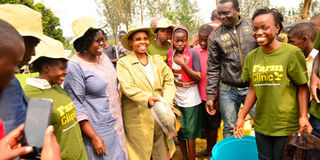Mukono Farm Clinic to launch coffee disease resistant clones

Farmers acquire fish farming tips during the previous Farm Clinic. Experts from Naads and partners will train farmers on the latest practices next week. PHOTO KELVIN ATUHAIRE
What you need to know:
Now that the next Monitor Seeds of Gold Farm Clinic will be held at the coffee hub - National Coffee Research Institute (NaCORI) at Kituuza,Mukono, on October 12, the crop experts, in conjunction with Uganda Coffee Development Authority (UCDA), are set to unveil their new coffee invention that they believe will change the coffee enterprise forever, writes Denis Bbosa
Uganda is Africa’s number one coffee exporter and second producer after Ethiopia. According to Uganda Coffee Development Authority (UCDA), Uganda’s coffee export earnings are estimated at 4.2 million 60kg bags, most of it going to Europe. Coffee is the third most important national income earner after tourism and foreign funding. More than 80 per cent of the coffee produced in Uganda is Robusta, a variety that is mostly grown on the lowland areas.
Robusta coffee threatened
NaCORI crop expert Barbra Nambooze says in 1993, a new coffee disease was reported in Mukono District, Central Uganda. Coffee wilt disease (CWD) threw many farmers in panic because all the Robusta varieties were succumbing to the strange disease.
According to UCDA annual reports, the disease led to coffee export reduction from 4.2 million 60kg bags of green beans in 1996/97 to two million bags in 2005/06.
The need for wilt-resistant varieties was critical for the survival of the coffee industry, and to sustain the livelihoods of about 1.7 million households who depend on the sub-sector.
In 1997, scientists at the Kituuza-based Naro institute, Coffee Research Centre (COREC) initiated a breeding programme to develop CWD resistant Robusta coffee varieties of acceptable farm and market traits.

Research
Researchers started with understanding the disease spread and effects through intensive surveys. The findings were crucial for stakeholders’ sensitisation and developing control strategies.
NARO developed a CWD management package that emphasised cultural methods, including uprooting and burning infected coffee trees, avoiding moving infested plant materials, and sterilising tools by flaming after working on an infected plant. A network of government agencies, NGOs and farmer organisations joined NARO in the nation-wide sensitisation.
In 2009, COREC (now NaCORI) released seven CWD resistant varieties named, Kituuza R1 to Kituuza R7. UCDA, Naro, private sector and development partners embarked on multiplication and distribution of the CWD resistant clones countrywide. Through these collaborations, more than two million CWD resistant seedlings were distributed countrywide, starting with the most severely affected districts. There was a sigh of relief.
Naro, with partners, trained certified coffee nursery operators on how to multiply clean clones. The varieties have since proved effective and are now a favourite for more than 90 per cent of Robusta famers in Uganda and across borders.
Currently, NaCORI supplies about 50,000 CWD resistant cuttings annually to UCDA to avail farmers and the Operation Wealth Creation (OWC) programme.
It also provided starter materials to more than 150 nursery operators in more than 40 Robusta coffee growing districts.
In July 2017, NaCORI released three (3) more CWD resistant varieties—NKR8, NKR9 and NKR10—to cater for the diverse ecological concerns in coffee-growing areas in the country.
These varieties produce better yields—average yield of 3,719kgs of hulled coffee beans per hectare per annum. They are resistant to CWD, leaf rust and red blister diseases, desired sensory tastes and relatively large bean sizes.
With funding from UCDA, the institute built a modern biotechnology laboratory to enhance production of quality and clean planting materials from about 100,000 to one million seedlings annually using tissue culture tools.




